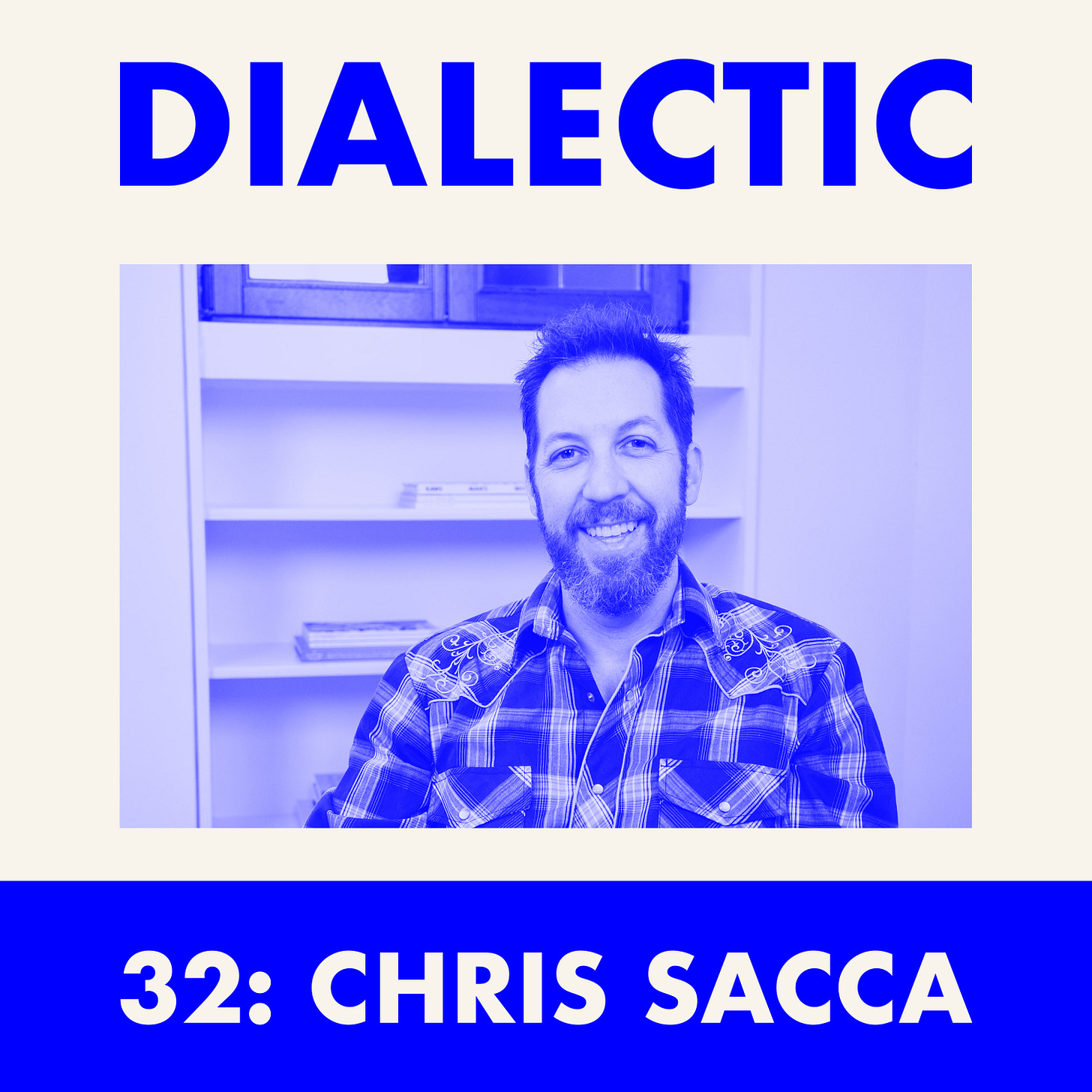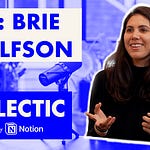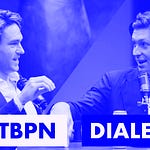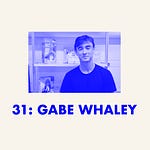I believe the first time I came across Chris Sacca was in college when I listened to the Gimlet Media’s Startup podcast, where Alex Blumberg pitched Chris on his new podcasting company and Chris tore his pitch to threads and rebuilt it for him on air. I first managed to meet Chris’s then-partner Matt and eventually landed a job at Chris’s legendary venture capital firm, Lowercase Capital. It was the most incredible seat a 21-year-old could have ever imagined. Over time, I ended up working more closely with Chris in what turned out to be the tail end of his time actively running Lowercase, which he stopped raising new funds for at the end of 2016.
You can imagine, then, how much of a full-circle moment for me it was to, almost ten years later, sit down with him and talk about life, investing, risk, writing, and the chapters life holds for us.
Chris is known for having what is probably the best performing venture fund of all time (214x for Lowercase I, which included first checks in Twitter, Uber, and Instagram) or for being provocative on Twitter, Shark Tank, and anywhere else he had the chance to speak.
He’s quieter in public forums these days, and sadly doesn’t tweet anymore, which made this all the more special. The thing I most admire about Chris is not the returns or the strong opinions, though. Its his relentless pursuit toward being true to himself and playing by his own rules. He’s walked away from dream jobs multiple times and keeps score only by what matters to him and small group of people he loves. I wrote about that on this newsletter once before in context of one of my favorite books that Chris recommended, and I’m excited to share a conversation that captures the same essence today.
I hope you enjoy it.
Dialectic Ep. 32: Chris Sacca - Drifting Back to Real
Dialectic Episode 32: Chris Sacca - Drifting Back to Real - is available on Spotify, Apple Podcasts, and YouTube, and all podcast platforms.
16 pieces of advice from Chris on stacking the deck in your favor, creating power with words, and remembering who you are and want to become:
Only play rigged games. Chris avoids public markets because he’s just a spectator there. In venture investing, he can actually shift the odds. His famous line: it may be lucky, but it’s not an accident.
Go long on the weirdos. When his team overlooked a founder trying to make it rain (literally) Chris sent them back immediately: “If we invest in normal people, all this money is going to go away.” Asymmetry lies on the frontier of crazy.
Words are the most democratic leverage. Growing up, Chris read his parents’ college textbooks. He realized words are free because you don’t need art supplies, canvases, or capital to get started with them. Language has tremendous leverage and is available to everyone regardless of credentials or status.
Stories are how you move people. Chris’s family would sit around the table with friends and swap stories. His Dad taught him how to set up a story, how to prime the punchline without giving it away, and the joy of a hearty laugh from the whole table. His father-in-law’s line reverberates: “every single person has a story; give them a chance to tell it.” We are all hungry for narrative, for tales, for things to believe in.
Find someone who calls your bullshit. The most enduring operators surround themselves with truth-tellers—people who’ll call them out. For Chris, that’s his wife, Crystal: “You’re so full of shit“ / “That’s a tired idea” / “Are you f*ing serious right now?” Every leader who goes off the rails invariably has no one around them to push back. Find your Crystal. Be someone’s Crystal.
Logic is no match for great metaphor. Chris once watched a federal prosecutor pull out a combination lock to (incorrectly) explain hacking to a judge. The courtroom shifted, all washed away by the right metaphor. “Good metaphor, simile, and analogy are the true weapons of mass destruction.” Once a metaphor lands in someone’s mind, you can’t dislodge it with facts, hard numbers, or cold evidence.
Change is driven by incentives, not guilt. “My job is to give you a choice you choose out of pure self-interest.” The soup-throwers won’t fix the climate issue by guilt-tripping people. A better, cheaper, easier product will. People will save the world for profit long before they’ll do it for virtue.
Strong negative reactions can be a sign. Anytime you have a disproportionately visceral rejection of something, you should train yourself to lean in. The things that make you recoil often point exactly where you need to go, which is true both in life and in investing.
You can become world-class in a year. Larry and Sergey to Chris in 2003: “With the tools available to us today, there is nothing keeping you from being one of the 50 most knowledgeable people in the world on a subject within a year.” Read everything. Listen to everything. Then visit everyone who wrote those things and ask to see their work. No one does this. But you can if you care enough.
Risk has a different profile when you’re a live player. “Most risk is mis-priced because it’s rooted in fear, imposter syndrome, and underpricing your ability to impact outcomes.” The “crazy” bets aren’t so foolish if you can impact what happens. Conviction comes from knowing how you can affect the game.
Don’t bubble wrap your kid’s life. Chris’s thesis on why kids today struggle: “Good decision-making comes from bad decision-making and feeling the consequences of, ‘whoops, that was stupid.’” He believes we’re raising a generation allergic to mistakes: helicopter parents, screen-addicted childhoods, kids suspended for playground scraps. We overclock for physical safety and underclock for online safety. The result? We’ve robbed kids of the chance to screw up, forgetting that competence requires contact with consequences.
Beware the tyranny of relevant experience*.* The most successful people Chris works with have no domain expertise in investing, and that once included him. When an early LP convinced him to launch a venture fund, Chris protested, but Hans Swildens brushed it off. The hard part, he said, wasn’t managing money. It was picking great companies and making them better.
Singular focus is the rarest luxury. Most days, the world scatters us into a hundred different directions. On his cross-country bike ride, Chris woke up with just one goal: get to the next town. “I knew my exact purpose. The only thing I had to do was get to the other side.” His mantra—Tonight, I will be in my bed—became a finish line he had to earn, day after day, even when his legs were spent and his body craved nothing but rest. How often do we get to want just one thing—and feel what it’s like to earn it?
Burn the boats. Chris searched for the common thread among his most successful founders. Immigrant kids? They have the hunger and the hustle. Single-parent families? Early responsibility, unbreakable resilience. Many hustled young, but not all. The only trait every one shared was that success was inevitable. “Not only did they not prepare for the downside case, it just wasn’t one of the options in the math. Zero was never a consideration or a possibility.”
Play by your own scorecard. Chris probably left Google with $100 million on the table. He walked away from Lowercase when everyone wanted in. “The only person who knows your scorecard is you.”
Drift back to the real you. “My biggest goal for myself is to drift back to the real me. The me that was covered in layers of pretense or inauthenticity or striving.” At every mountaintop, Chris has found a way to shed his skin and exit the local maximum on the way to becoming more true to himself.
Description
Chris Sacca is an investor and founder of Lowercarbon Capital and Lowercase Capital.
Prior to becoming an investor, Chris grew up in Buffalo, NY; studied around the world by way of the Georgetown School of Foreign Service; turned his student loans in $12M in the tech bubble of 2000 before losing it all and then some; and broke into Silicon Valley before eventually landing at Google, where he won the founders award. Then Chris started angel investing, which led to his first venture fund, Lowercase I. Lowercase I is one of if not the best performing VC funds ever, by multiple, at 214x, and included Twitter, Uber, Instagram, and more.
Toward the end of Lowercase, I had the pleasure of working with Chris. Around that time, he was also a Guest Shark on Shark Tank. Chris was heavily involved in both Obama campaigns and was a large supporter of Hillary Clinton in 2016. When Trump won, he wound down new investing at Lowercase and “hung up his spurs” to focus on political and democracy related efforts. Then, in 2018, Chris started Lowercarbon Capital to invest in “un-f*cking the planet”: carbon removal, climate science, cooling the planet, and eventually nuclear fusion.
We talked about writing and storytelling, keeping people around who keep you honest, having a good taste in “weird,” playing rigged games, taking the right kind of risks, and how even billionaires have imposter syndrome. We also get into how great founders embody inevitability, what makes the people at Lowercarbon special, how much Chris thinks about AI, and the many chapters of Chris’s life, including whatever might be next.
Authenticity is a moving target for all of us, but one of the things I most admire about Chris is his ability and desire to shamelessly play his own game.
Timestamps
(0:00): Open: The Common Thread Amongst The Best Founders
(1:26): Intro
(3:49): Coast to Coast
(12:36): Leaning into Weird & Investing in Fusion
(24:42): Having People Who Keep You in Check
(32:07): The Power of Language and Stories
(1:03:10): Investing, Risk, and Wild Confidence
(1:28:03): Imposter Syndrome and Making Companies Better
(1:38:10): Lowercarbon’s Team and Culture
(1:57:54): Chris’s Life Chapters, AI, and Creative Outlets
(2:22:11): Drifting Back Towards Real










